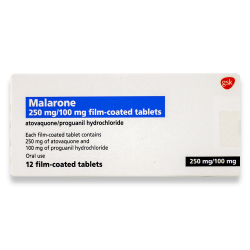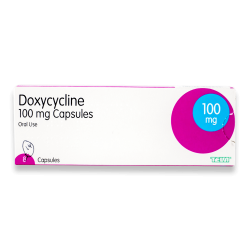All treatments
- Review by a qualified doctor
- Including prescription
- Next-day delivery included
Malarone is the most popular malaria treatment. It has few side effects. Start two days before you travel, and continue until seven days after your return.
You can order here or click the advise me button to find out what’s best for you.
Doxycycline is an antibiotic that prevents malaria. Alcohol consumption is not recommended with this treatment.
Start two days before you travel, and continue until 28 days after your return.
You can order here or click the advise me button to find out what’s best for you.
What Is Malaria?
Malaria is a tropical infectious disease caused by the Plasmodium parasite. Spread by infected female anopheles mosquitos, malaria can be fatal if not diagnosed and treated quickly.
There are 5 types of the Plasmodium parasite that can cause malaria in humans:
- Plasmodium falciparum–the most common malaria parasite, which can cause severe malaria due to its ability to rapidly multiply in the blood. Found in tropical and subtropical countries worldwide, but mainly in Africa.
- Plasmodium vivax–causes milder symptoms,but can remain dormant in the liver and cause relapses years after the infecting bite. Found mainly in Asia and South America, as well as parts of Africa.
- Plasmodium ovale–fairly uncommon,but can also remain dormant in the liver and cause relapses years after the infecting bite. Found mainly in Africa, especially West Africa.
- Plasmodium malariae–fairly uncommon.Found mainly in sub-Saharan Africa, as well as in Asia and South America.
- Plasmodium knowlesi–very rare, this parasite typically infects primates,but has led to human malaria as well. Found in parts of Southeast Asia.
Where is malaria common?
Malaria is transmitted in over 100 countries and territories. It is common in tropical and subtropical areas where the Anopheles mosquito can breed successfully, including sub-Saharan Africa, Central and South America, the Caribbean, South East Asia and the Pacific Islands. Even in these areas, however, malaria transmission does not occur at very high altitudes or in deserts.
You can't become infected by malaria in the UK. However, about 1,500 people are treated for malaria in the UK each year having become infected while abroad.
What causes malaria?
When an infected female anopheles mosquito bites you, the Plasmodium parasite is released into your body. The parasite enters your bloodstream and travels to your liver where the infection develops. It then re-enters your bloodstream and begins infecting red blood cells. The parasite multiplies in your red blood cells, causing them to explode and release more parasites into your bloodstream. As the parasite multiplies and spreads, your symptoms worsen.
If an uninfected female anopheles mosquito bites an infected person, the mosquito can become infected and spread malaria to other people it bites. Malaria is not contagious, so it can't be spread directly from person to person. In rare instances, it can be spread through blood transfusions and needle sharing. Malaria can also be passed from a mother to her unborn baby.
What are the symptoms of malaria?
Malaria symptoms usually develop between 7 and 18 days after being bitten and infected. This time is called the incubation period. It can sometimes take up to a year for symptoms to develop, depending on the type of Plasmodium parasite that infects you and what antimalarial medications you've taken.
Malaria symptoms are flu-like and may include:
- a fever
- a headache
- a stomach ache
- diarrhoea
- vomiting
- chills and sweats
- a general unwell feeling
- loss of appetite
- a cough
Some types of malaria have symptoms that run in 48 hour cycles. These bouts of symptoms usually last for 6 to 12 hours and include three stages: cold shivers, then a fever and headache, and finally severe sweating and fatigue.
What are the symptoms of severe malaria?
Malaria symptoms can become very severe, as the illness develops into a more complicated form. This is more likely if you are infected by the Plasmodium falciparum parasite. This parasite multiplies rapidly, destroying red blood cells and potentially causing anaemia.
Severe malaria can develop into serious, potentially fatal complications, which are medical emergencies. It can affect your brain, causing cerebral malaria. This is a life-threatening illness where your brain swells, potentially causing permanent brain damage, seizures and a coma. Complications can also affect your kidneys, blood and lungs.
Symptoms of severe malaria can include:
- jaundice – yellowing of your skin or the whites of your eyes
- pulmonary oedema – a build-up of fluid in your lungs causing difficulty breathing
- hypoglycaemia – low blood sugar that can make you light-headed
- shock – a sudden drop in blood pressure
- loss of consciousness
- kidney failure
- acute respiratory distress syndrome (ARDS)
- swelling and rupturing of the spleen
- dehydration
People at a higher risk of severe malaria include:
- pregnant women
- babies and young children
- elderly people
- people with weakened immune systems, such as those with HIV/AIDS
How can I prevent malaria?
The only way to completely prevent malaria is to not get bitten by any mosquitos, which is usually not possible in tropical areas. The best method for malaria prevention is two-fold: avoid being bitten by mosquitos as much as possible and take antimalarial medication.
To avoid mosquito bites, take the following precautions:
- take extra care at night, as this is when the Anopheles mosquito likes to feed
- if possible, stay somewhere that has screened windows and doors
- use mosquito nets treated with insecticide when sleeping
- wear insect repellent with DEET (diethyltoluamide) on your skin, and reapply it frequently
- wear long, loose-fitting trousers and shirts with long sleeves
See the following section for advice on antimalarial medication.
What malaria medication is available?
Prevention is by far the most effective method of combatting malaria. There is currently no malaria vaccine available, so it is crucial that you take antimalarial medication before travelling to reduce your chances of becoming infected. These medications are proven to be effective, but they don't completely prevent against malaria, so avoiding mosquito bites is also necessary.
The type of antimalarial medicine you need depends on your destination – which type of malaria is present and whether or not the mosquitos are resistant to certain antimalarial medicines. Check with your GP or pharmacist to ensure that you get to correct medication. Each medication will also have different instructions, so make sure to follow them closely.
121doc stocks some of the most popular antimalarial medications:
- Doxycycline
- Paludrine/Avloclor
- Malarone
You will need to start taking the medication before you travel to ensure maximum protection, so order yours online now.
If you have already travelled to an area with malaria and think you may have been infected, see your GP immediately. With the correct medical attention, malaria can be treated and cured.
FAQs
Our consultations include general questions about your health (e.g. blood pressure levels, current and past conditions), as well as specific questions related to your selected treatment. We will also request relevant personal information to complete payment and delivery.
All questions are necessary, and your answers and details will not be shared with any third-parties. Only our doctors have access to your medical information.



